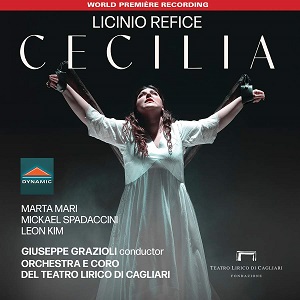
Licinio Refice (1883-1954)
Cecilia (sacred opera in 3 episodes and 4 scenes)
rec. live composite January-February 2022, Teatro Lirico do Cagliari, Sardinia
L’Angelo di Dio (Angel of God): Elena Schirru (soprano)
Cecilia: Marta Mari (soprano)
Valeriano: Mickael Spadaccini (tenor)
Tiburzio/ Amachio: Leon Kim (baritone)
La vecchia cieca (Blind old woman): Giuseppina Piunti (mezzo-soprano)
Il Vescovo Urbano (Bishop Urbano): Alessandro Spina (bass)
Un liberto/un neofita: Christian Collia (tenor)
Uno schiavo (A slave): Patrizio La Placa (baritone)
Orchestra e Coro del Teatro Lirica di Cagliari/Giuseppe Grazioli
Italian libretto & English translation
Dynamic CDS7967.02 [2 CDs: 113]
Licinio Refice is largely neglected today except for one immortal song which still features in recitals: “Ombra di nube”, given an exquisite, heart-stopping recording by Claudio Muzio who the year before that song was written created the eponymous lead role in this opera under review. (Incidentally, I would hardly agree with the author of the notes who claims that she, despite being “one of the finest Italian singers of the first half of the 1900s… has been virtually forgotten”; she is very much remembered, at least by operatic cognoscenti.)
The martyrdom of St Cecilia, the patron saint of music, her husband and brother-in-law is a story which for obvious reasons has attracted composers down the ages including Refice, who was both a Catholic priest and composer. The music is unashamedly veristic and highly emotional; the influence of Puccini, Zandonai, Mascagni, Giordano and Cilea is very much in evidence but tempered by a mystical, exotic, perhaps Byzantine, element and the pervasive perfume of Gregorian chant in Refice’s compositional style. This is undoubtedly sensuous music which maintains great dignity and poise despite the sensationalist potential of its drama. If it has any weakness, that is more to do with Emidio Mucci’s rather tin-eared libretto – and how often has that failing been observed of an opera which is otherwise musically admirable?
Despite the success of that premiere in 1934 and over a thousand subsequent performances, as far as I know, Cecilia has received no attention in the recording studio apart from the arias recorded by Muzio and Renata Tebaldi. There are, however, several recordings of live performances; the best known are those with Tebaldi in 1953 in very gritty, distant sound that is close to unlistenable and another by Renata Scotto, which is in fair stereo sound – but also marred by intrusive coughing – and offers only excerpts from the first two acts, but the whole of Act III. The most recent, recorded live in the Cathedral of Monte Carlo in 2013, was the first complete commercial recording but was generally accounted vocally flawed and no more than mediocre. In other words, for reasons of sound, cuts or performance, we lack a good-all-round recording of the complete work; the question is whether this new, live, digital recording is what we have been waiting for.
The opening indications are quite good. Elena Schirru’s Angel of God is impressively full and ecstatic – even if her vibrato is rather pronounced – more of that anon – and the orchestral playing is impressively rich and sonorous. The chorus is lovely. However, when the bustle of the wedding preparations and household gossip ensues, the listener will soon observe that some voices display an excess of vibrato, the besetting technical flaw among too many modern singers. Neither baritone Leon Kim nor tenor Mickael Spadaccini is exempt from that fault; their pulsing vocal production robs their music of elegance of line and denotes a lack of proper pharyngeal phonation supporting each note. Spadaccini’s tenor has little or no bloom; his voice is dry and forced and he has trouble sustaining a line without faltering. Compensation is forthcoming in the magnificence of the choral passage welcoming the appearance of the bride but as soon as the Cecilia, Marta Mari, begins to sing, I am disappointed, because although her volume is sizeable, she too, evinces the same beat in her voice. (What are conservatories doing these days?) Her duet with Valeriano fails to impress because he sounds strained and her soprano flaps. It is also hard to empathise with Cecilia; vows of chastity are all very well but hardly sit well with her mutually exclusive declaration of conjugal love and her insistence upon maintaining their union as a “mariage blanc”.
The second and third “episodes” on CD 2 bring more of the same frustration – all the more regrettable, since they contain some lovely music, such as the Lento assai introduction to the Second Episode. This contains the scene for Bishop Urban, so notably sung by Giulio Neri with Tebaldi – but before that, we hear Giuseppina Piunti as the Blind Old Woman, and you will perhaps not be surprised to hear that her voice is marred by an absolutely intolerable wobble so slow that it is an offense to the ears – and by which point my patience is exhausted. Some relief is provided by the relatively light but reasonably warm and steady bass of Alessandro Spina as the bishop, who, deo gratias (an appropriate interjection here) sings employing a conventional vibrato and makes a nice job of his narration of St Paul’s conversion on the road to Damascus. The best things here by far are the choruses. I am unable to appreciate the pathos of Cecilia’s dying moments while irritated by poor singing and feel like responding to the “Alleluias” closing the work for reasons different from those the composer and performers here intended.
For all that I esteem sensitive conducting, intelligent productions, skilful orchestral execution and fine choral singing, for me the success of an opera must primarily depend upon the solo singing and nobody here affords me much aural pleasure. Sadly, the answer to my question is that we are still awaiting a recording which does this opera justice. This is undoubtedly a missed opportunity.
Ralph Moore
Help us financially by purchasing from





















